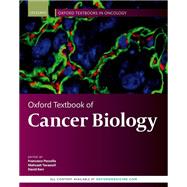
Oxford Textbook of Cancer Biology
by Pezzella, Francesco; Tavassoli, Mahvash; Kerr, David-
 eCampus.com Device Compatibility Matrix
eCampus.com Device Compatibility Matrix
Click the device icon to install or view instructions
Buy New
Rent Textbook
Rent Digital
Used Textbook
We're Sorry
Sold Out
How Marketplace Works:
- This item is offered by an independent seller and not shipped from our warehouse
- Item details like edition and cover design may differ from our description; see seller's comments before ordering.
- Sellers much confirm and ship within two business days; otherwise, the order will be cancelled and refunded.
- Marketplace purchases cannot be returned to eCampus.com. Contact the seller directly for inquiries; if no response within two days, contact customer service.
- Additional shipping costs apply to Marketplace purchases. Review shipping costs at checkout.
Summary
Structured in eight sections, the book starts with a review of the development and biology of multi-cellular organisms, how they maintain a healthy homeostasis in an individual, and a description of the molecular basis of cancer development. The book then illustrates, as once cells become neoplastic, their signalling network is altered and pathological behaviour follows. It explores the changes that cancer cells can induce in nearby normal tissue, the new relationship established between them and the stroma, and the interaction between the immune system and tumour growth. The authors illustrate the contribution provided by high throughput techniques to map cancer at different levels, from genomic sequencing to cellular metabolic functions, and how information technology, with its vast amounts of data, is integrated with traditional cell biology to provide a global view of the disease. The effect of the different types of treatments on the biology of the neoplastic cells are explored to understand on the one side, why some treatments succeed, and on the other, how they can affect the biology of resistant and recurrent disease. The book concludes by summarizing what we know to date about cancer, and in what direction our understanding of cancer is moving.
Edited by leading authorities in the field with an international team of contributors, this book is an essential resource for scholars and professionals working in the wide variety of sub-disciplines that make up today's cancer research and treatment community. It is written not only for consultation, but also for easy cover-to-cover reading.
Author Biography
Francesco Pezzella, Professor of Tumour Pathology, University of Oxford, UK,Mahvash Tavassoli, Professor of Molecular Oncology, King's College London, UK,David Kerr, Professor of Cancer Medicine, University of Oxford, UK; and Adjunct Professor of Medicine, Weill Cornell College of Medicine, New York, USA
Table of Contents
Section 1: The multicellular organism
1. The multicellular organism and cancer, Francesco Pezzella, David Kerr, and Mahvash Tavassoli
2. DNA repair and genome integrity, Giacomo Buscemi
3. Evolution and cancer, Tom Donnem and Francesco Pezzella
Section 2: The etiology of cancer
4. Genetics and genetic instability in cancer, Mark A. Glaire and David N. Church
5. Epigenetics, Edward Hookway, Nicholas Athanasou, and Udo Oppermann
6. Viral carcinogenesis - an overview, Dirk P. Dittmer and Blossom Damania
7. Chemical carcinogens, David H. Phillips
8. Radiation as a Carcinogen, Yan-Qun Xiang and Chao-Nan Qian
Section 3: How the cancer cell works
9. Growth factors and associated signalling pathways in tumour progression and in cancer treatment, Nadege Gaborit and Yosef Yarden
10. Hormones and Cancer, Balkees Abderrahman and V. Craig Jordan
11. Oncogenesis and tumour suppression, Mahvash Tavassoli and Francesco Pezzella
12. The signaling pathways in cancer, Jiangting Hu
13. Cell cycle control, Simon Carr and Nicholas La Thangue
14. Cancer and cell death, Jessica Bullenkamp and Mahvash Tavassoli
15. Telomerase and immortalisation, Laura Collopy and Kazunori Tomita
16. Cancer metabolism, Almut Schulze, Karim Bensaad, and Adrian L Harris
17. Chaperones and protein quality control in the neoplastic process, Andrea Rasola
18. Oxygen and cancer: the response to hypoxia, Adrian L Harris and Margaret Ashcroft
19. Invasion, Metastasis and Tumor Dormancy, Andrey Ugolkov and Andrew P. Mazar
20. Cancer Stem Cells, Connor Sweeney, Lynn Quek, Betty Gration, and Paresh Vyas
Section 4: Cancer microenvironment
21. Cancer associated stroma, W.E. Mesker and R.A.E.M. Tollenaar
22. Blood vessels and cancer, Francesco Pezzella and Robert Kerbel
23. Cancer Immunology, Herman Waldmann
Section 5: Global vision of cancer
24. Molecular profiling in cancer research and personalized medicine, Pieter-Jan van Dam and Steven Van Laere
25. Proteomics and metabolomics applications in cancer biology, Pedro Cutillas and Benedikt M. Kessler
26. Cancer systems biology: from molecular profiles to pathways, signalling networks and therapeutic vulnerabilities, Lieven Verbeke and Steven Van Laere
27. Cancer biology through immunohistology, Karen Pulford and Kevin Gatter
Section 6: The biology of cancer treatment
28. Principles of chemotherapy, David Kerr, Daniel Haller, and Jaap Verweij
29. Immunotherapy and Tumour Resistance to immune mediated control and elimination, Gwennaelle C. Monnot and Pedro Romero
30. Biological effect of radiotherapy on cancer cells, Anna Dubrovska, Mechthild Krause, and Michael Baumann
Section 7: Conclusions
31. Benign tumours: the forgotten neoplasms, Francesco Pezzella, Adrian L Harris, and Mahvash Tavassoli
32. Conclusions: cancer biology, a moveable feast, David Kerr and Mahvash Tavassoli
An electronic version of this book is available through VitalSource.
This book is viewable on PC, Mac, iPhone, iPad, iPod Touch, and most smartphones.
By purchasing, you will be able to view this book online, as well as download it, for the chosen number of days.
Digital License
You are licensing a digital product for a set duration. Durations are set forth in the product description, with "Lifetime" typically meaning five (5) years of online access and permanent download to a supported device. All licenses are non-transferable.
More details can be found here.
A downloadable version of this book is available through the eCampus Reader or compatible Adobe readers.
Applications are available on iOS, Android, PC, Mac, and Windows Mobile platforms.
Please view the compatibility matrix prior to purchase.

